【BBC六分钟英语】您的心理健康是否受到气候变化的影响?

【英文脚本】
Beth
Hello and welcome to 6 Minute English from BBC Learning English. I’m Beth.
Neil
And I’m Neil. Today we’re going to talk about climate change and how it can affect people’s mental health. Natural disasters and the impacts of climate change can be stressful. Isn’t that right, Beth?
Beth
Yeah, definitely. In today’s episode we’re going to find out about how people can protect their mental health from the impacts of climate change. We’ll be hearing from a psychiatry expert and a man who survived a wildfire and helped rebuild his town.
Neil
But first, Beth, I have a question for you. Scientists aren’t always sure whether natural disasters like floods and wildfires are as a result of human-caused climate change. But in January 2025, big wildfires affected big parts of Los Angeles in California. But according to research organisation World Weather Attribution, human-caused climate change made the fires: a) 10% more likely b) 35% more likely c) 20% less likely
Beth
Erm… I’m going to say 10% more likely.
Neil
OK. Well, we’ll find out the answer at the end of the programme. Now, natural disasters like floods and wildfires can destroy homes and communities.
Beth
People who live in areas affected by natural disasters can often experience climate trauma. Trauma is what we call the very bad and long-lasting emotional effects of an event or experience.
Neil
Professor Jyoti Mishra is an expert in climate trauma at the University of California. She explained more about the condition to Graihagh Jackson, host of BBC World Service programme, The Climate Question.
Jyoti Mishra
Climate trauma is not an individual trauma, it’s a community-wide trauma which really requires community-wide healing.
Graihagh Jackson
Yeah, I’m really struck by what you’ve said about the fact that it’s whole communities that are affected, not individuals, but also part of the solution is about the community and how it rebuilds and reknits together.
Jyoti Mishra
Absolutely, yes. So, we’ve found that individuals who have a greater sense of positive support from their family and a greater sense of meaningful connection with their community — they are in general more resilient.
Beth
Jyoti’s research on climate trauma has found that it affects communities rather than individuals.
Neil
Host of the programme Graihagh Jackson is struck by what Jyoti says. If you’re struck by an idea, you find it particularly interesting or impressive.
Beth
Graihagh says that part of the solution to climate trauma could be in how the community reknits together. This means how the social connections in a community are restored. We can often describe a community as close-knit, which means everyone helps and supports each other.
Neil
Jyoti explains that having a strong community also helps reduce or heal climate trauma. She says that research has found that people who have a strong community are more resilient when bad things, like natural disasters, happen. If you’re resilient, you’re able to get better more easily after something difficult or bad happens.
Beth
One person who had to be resilient is Brad Sherwood. He survived a wildfire in Northern California in 2017 called the Tubbs fire, but when he returned home, his neighbourhood was destroyed.
Neil
Brad started to volunteer for a local support network called After the Fire to try to rebuild his community, as he explained to BBC World Service programme, The Climate Question.
Brad Sherwood
The silver lining in all this — I mean, if it wasn’t for the Tubbs fire, we wouldn’t be working as a community right now to build a new community plaza. We were a close community before the Tubbs, but afterwards we are so much stronger and resilient. And I think our children are as well. They can jump over any hurdle.
Beth
Brad says that the work to rebuild and improve his community is the silver lining to the fire. The expression silver lining means a positive thing that comes from a negative situation.
Neil
Brad’s community became more resilient after the fire, including the children. He says that they can jump over any hurdle. We can describe challenges or difficult things in life as hurdles.
Beth
And it’s quite inspiring, I think, to hear how Brad has taken a bad situation and tried to stay resilient. Now, the organisation Brad volunteers for, After the Fire, are helping those impacted by the fires in LA in January.
Neil
Which reminds me, I asked you, Beth, about the impacts of human-made climate change on the wildfires in LA in January.
Beth
And I said 10% more likely.
Neil
Which was, I’m afraid, the wrong answer. It was actually 35%.
Beth
Wow. OK. Well, let’s recap the vocabulary we’ve learnt, starting with trauma, which is what we call the very bad and long-lasting emotional effects of an event or experience.
Neil
If you’re struck by an idea or something someone has said, you find it particularly interesting or impressive.
Beth
If a community reknits together, it becomes closer again. And a close-knit community is where everyone looks after each other.
Neil
Resilient means able to get better more easily when bad things happen.
Beth
A silver lining is a positive thing that comes from a negative situation.
Neil
And we can describe challenges or difficult things in life as hurdles.
Beth
Once again, our six minutes are up, but why not try the interactive quiz on our website to test what you’ve learned, and we have a free worksheet as well. Just visit bbclearningenglish.com.
Neil
Thanks for listening and goodbye!
Beth
Bye!
【中英文双语脚本】
Beth(贝丝)
Hello and welcome to 6 Minute English from BBC Learning English. I’m Beth.
您好,欢迎来到 BBC Learning English 的 6 Minute English。我是贝丝。
Neil(尼尔)
And I’m Neil. Today we’re going to talk about climate change and how it can affect people’s mental health. Natural disasters and the impacts of climate change can be stressful. Isn’t that right, Beth?
我是 Neil。今天,我们将讨论气候变化及其如何影响人们的心理健康。自然灾害和气候变化的影响可能会带来压力。贝丝,不是吗?
Beth(贝丝)
Yeah, definitely. In today’s episode we’re going to find out about how people can protect their mental health from the impacts of climate change. We’ll be hearing from a psychiatry expert and a man who survived a wildfire and helped rebuild his town.
是的,当然。在今天的节目中,我们将了解人们如何保护自己的心理健康免受气候变化的影响。我们将听到一位精神病学专家和一位在野火中幸存下来并帮助重建小镇的男子的心声。
Neil(尼尔)
But first, Beth, I have a question for you. Scientists aren’t always sure whether natural disasters like floods and wildfires are as a result of human-caused climate change. But in January 2025, big wildfires affected big parts of Los Angeles in California. But according to research organisation World Weather Attribution, human-caused climate change made the fires: a) 10% more likely b) 35% more likely c) 20% less likely
但首先,贝丝,我有一个问题要问你。科学家们并不总是确定洪水和野火等自然灾害是否是人为造成的气候变化的结果。但在 2025 年 1 月,大野火影响了加利福尼亚州洛杉矶的大部分地区。但根据研究组织 World Weather Attribution 的数据,人为造成的气候变化使火灾发生:a) 可能性增加 10% b) 可能性增加 35% c) 可能性降低 20%
Beth(贝丝)
Erm… I’m going to say 10% more likely.
呃…我要说的可能性要高出 10%。
Neil(尼尔)
OK. Well, we’ll find out the answer at the end of the programme. Now, natural disasters like floods and wildfires can destroy homes and communities.
还行。好吧,我们将在节目结束时找到答案。现在,洪水和野火等自然灾害可能会摧毁房屋和社区。
Beth(贝丝)
People who live in areas affected by natural disasters can often experience climate trauma. Trauma is what we call the very bad and long-lasting emotional effects of an event or experience.
生活在受自然灾害影响地区的人们经常会遭受气候创伤。创伤就是我们所说的事件或经历对非常糟糕和持久的情绪影响。
Neil(尼尔)
Professor Jyoti Mishra is an expert in climate trauma at the University of California. She explained more about the condition to Graihagh Jackson, host of BBC World Service programme, The Climate Question.
乔蒂·米什拉(Jyoti Mishra)教授是加州大学(University of California)的气候创伤专家。她向 BBC 世界服务节目《气候问题》的主持人格雷哈·杰克逊 (Graihagh Jackson) 解释了更多关于这种情况的信息。
Jyoti Mishra(乔蒂·米什拉)
Climate trauma is not an individual trauma, it’s a community-wide trauma which really requires community-wide healing.
气候创伤不是个人创伤,而是社区范围的创伤,确实需要社区范围的治愈。
Graihagh Jackson(格雷哈·杰克逊)
Yeah, I’m really struck by what you’ve said about the fact that it’s whole communities that are affected, not individuals, but also part of the solution is about the community and how it rebuilds and reknits together.
是的,你说的受影响的是整个社区,而不是个人,我真的很震惊,但解决方案的一部分是关于社区以及它如何重建和重新团结在一起。
Jyoti Mishra(乔蒂·米什拉)
Absolutely, yes. So, we’ve found that individuals who have a greater sense of positive support from their family and a greater sense of meaningful connection with their community — they are in general more resilient.
绝对是的。因此,我们发现,来自家庭的积极支持感更强、与社区建立更有意义的联系的人 —— 他们通常更有韧性。
Beth(贝丝)
Jyoti’s research on climate trauma has found that it affects communities rather than individuals.
乔蒂对气候创伤的研究发现,它影响的是社区而不是个人。
Neil(尼尔)
Host of the programme Graihagh Jackson is struck by what Jyoti says. If you’re struck by an idea, you find it particularly interesting or impressive.
节目主持人 Graihagh Jackson 对 Jyoti 所说的话感到震惊。如果你被一个想法所打动,你会觉得它特别有趣或令人印象深刻。
Beth(贝丝)
Graihagh says that part of the solution to climate trauma could be in how the community reknits together. This means how the social connections in a community are restored. We can often describe a community as close-knit, which means everyone helps and supports each other.
Graihagh 说,解决气候创伤的部分方法可能是社区如何团结一致。这意味着社区中的社会联系是如何恢复的。我们通常可以将社区描述为紧密联系,这意味着每个人都互相帮助和支持。
Neil(尼尔)
Jyoti explains that having a strong community also helps reduce or heal climate trauma. She says that research has found that people who have a strong community are more resilient when bad things, like natural disasters, happen. If you’re resilient, you’re able to get better more easily after something difficult or bad happens.
乔蒂解释说,拥有一个强大的社区也有助于减少或治愈气候创伤。她说,研究发现,当自然灾害等坏事发生时,拥有强大社区的人会更有韧性。如果你有韧性,你就能在困难或糟糕的事情发生后更容易地变得更好。
Beth(贝丝)
One person who had to be resilient is Brad Sherwood. He survived a wildfire in Northern California in 2017 called the Tubbs fire, but when he returned home, his neighbourhood was destroyed.
一个必须坚韧不拔的人是布拉德·舍伍德。2017 年,他在北加州一场名为 Tubbs fire 的野火中幸存下来,但当他回到家时,他的社区被摧毁了。
Neil(尼尔)
Brad started to volunteer for a local support network called After the Fire to try to rebuild his community, as he explained to BBC World Service programme, The Climate Question.
布拉德开始自愿加入一个名为 After the Fire 的当地支持网络,试图重建他的社区,正如他在 BBC 世界服务节目 The Climate Question 中解释的那样。
Brad Sherwood(布拉德·舍伍德)
The silver lining in all this — I mean, if it wasn’t for the Tubbs fire, we wouldn’t be working as a community right now to build a new community plaza. We were a close community before the Tubbs, but afterwards we are so much stronger and resilient. And I think our children are as well. They can jump over any hurdle.
这一切中的一线希望 —— 我的意思是,如果不是塔布斯大火,我们现在就不会作为一个社区来建造一个新的社区广场。在 Tubbs 之前,我们是一个亲密的社区,但之后我们变得更加强大和有弹性。我认为我们的孩子也是如此。他们可以跳过任何障碍。
Beth(贝丝)
Brad says that the work to rebuild and improve his community is the silver lining to the fire. The expression silver lining means a positive thing that comes from a negative situation.
布拉德说,重建和改善他的社区的工作是火中的一线希望。一线希望一词的意思是来自消极情况的积极事物。
Neil(尼尔)
Brad’s community became more resilient after the fire, including the children. He says that they can jump over any hurdle. We can describe challenges or difficult things in life as hurdles.
火灾发生后,布拉德所在的社区变得更有弹性,包括孩子们。他说他们可以跳过任何障碍。我们可以将生活中的挑战或困难的事情描述为障碍。
Beth(贝丝)
And it’s quite inspiring, I think, to hear how Brad has taken a bad situation and tried to stay resilient. Now, the organisation Brad volunteers for, After the Fire, are helping those impacted by the fires in LA in January.
我认为,听到 Brad 如何应对糟糕的情况并努力保持韧性,这非常鼓舞人心。现在,Brad 志愿服务的组织 After the Fire 正在帮助那些受 1 月份洛杉矶火灾影响的人。
Neil(尼尔)
Which reminds me, I asked you, Beth, about the impacts of human-made climate change on the wildfires in LA in January.
这让我想起了,贝丝,我问你关于人为气候变化对 1 月份洛杉矶野火的影响。
Beth(贝丝)
And I said 10% more likely.
我说可能性要高 10%。
Neil(尼尔)
Which was, I’m afraid, the wrong answer. It was actually 35%.
恐怕,这是错误的答案。实际上是 35%。
Beth(贝丝)
Wow. OK. Well, let’s recap the vocabulary we’ve learnt, starting with trauma, which is what we call the very bad and long-lasting emotional effects of an event or experience.
哇。还行。好吧,让我们回顾一下我们学到的词汇,从创伤开始,这就是我们所说的事件或经历对非常糟糕和持久的情绪影响。
Neil(尼尔)
If you’re struck by an idea or something someone has said, you find it particularly interesting or impressive.
如果你被某人所说的某个想法或某事所打动,你会觉得它特别有趣或令人印象深刻。
Beth(贝丝)
If a community reknits together, it becomes closer again. And a close-knit community is where everyone looks after each other.
如果一个社区重新团结在一起,它就会再次变得更加紧密。而一个紧密联系的社区是每个人都互相照顾的地方。
Neil(尼尔)
Resilient means able to get better more easily when bad things happen.
韧性意味着当坏事发生时,能够更容易地变得更好。
Beth(贝丝)
A silver lining is a positive thing that comes from a negative situation.
一线希望是来自消极情况的积极事物。
Neil(尼尔)
And we can describe challenges or difficult things in life as hurdles.
我们可以将生活中的挑战或困难的事情描述为障碍。
Beth(贝丝)
Once again, our six minutes are up, but why not try the interactive quiz on our website to test what you’ve learned, and we have a free worksheet as well. Just visit bbclearningenglish.com.
再一次,我们的六分钟时间到了,但为什么不尝试我们网站上的交互式测验来测试您学到的知识,我们还有一个免费的工作表。只需访问 bbclearningenglish.com。
Neil(尼尔)
Thanks for listening and goodbye!
感谢聆听,再见!
Beth(贝丝)
Bye!
再见!


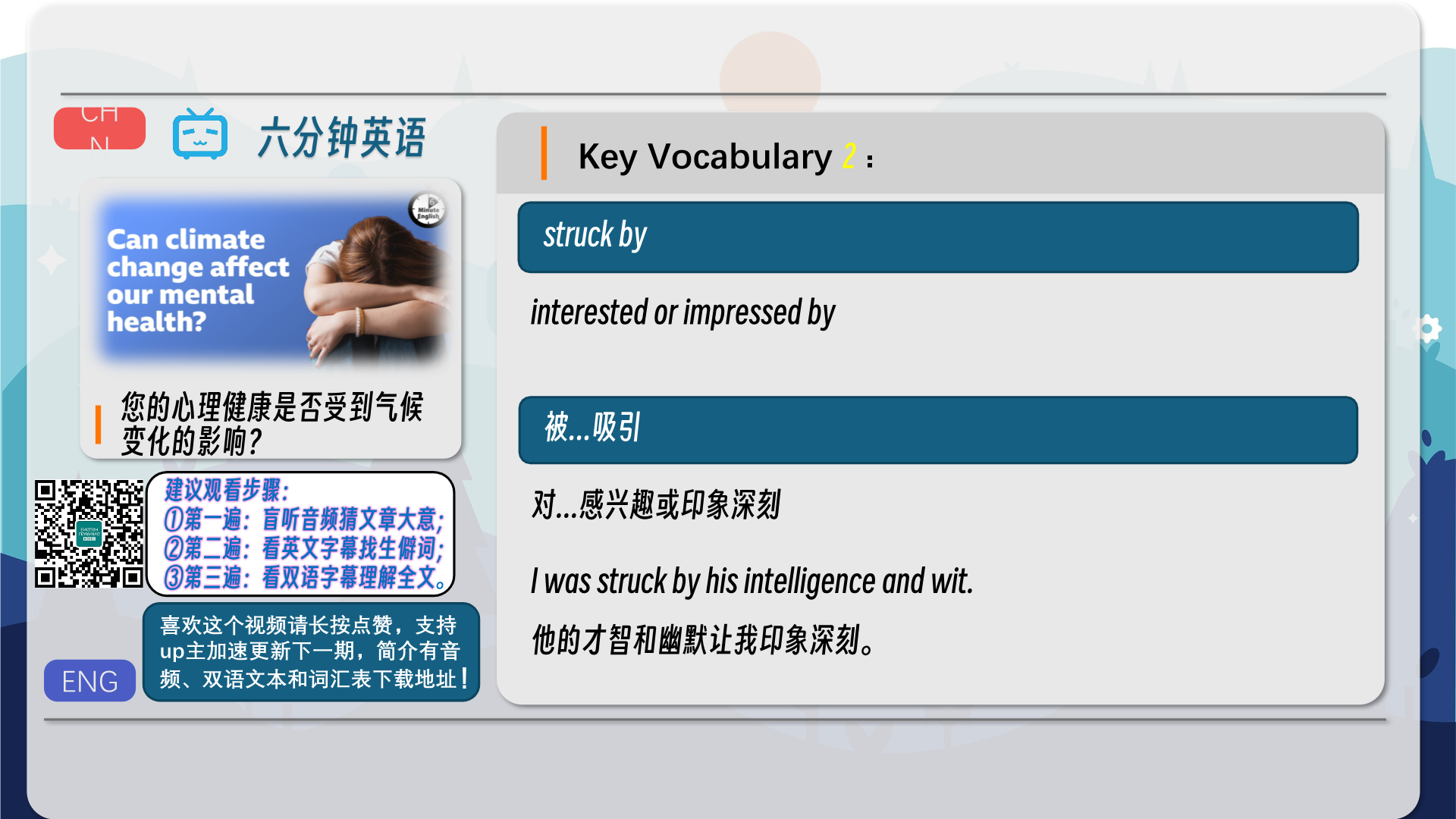

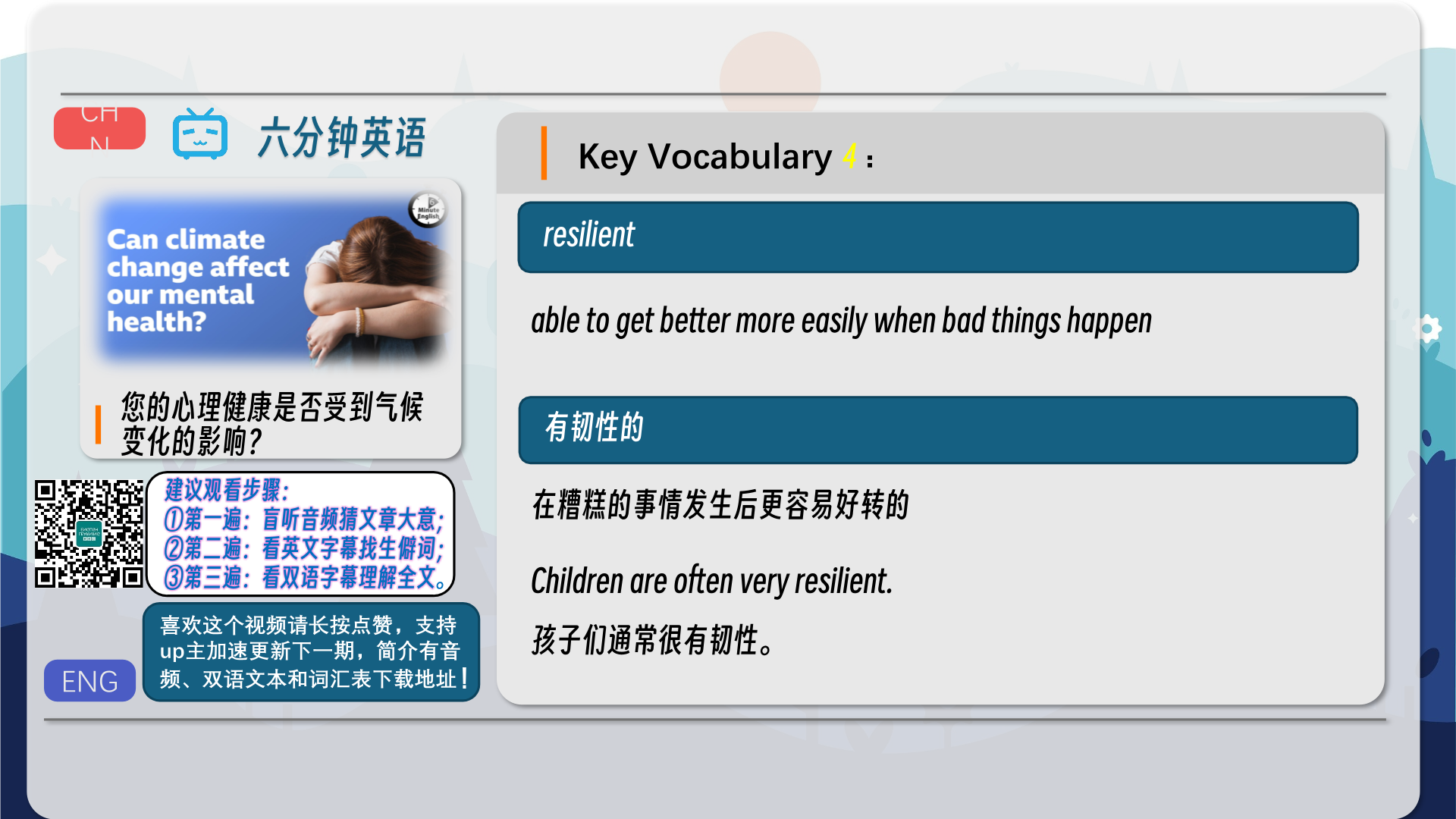
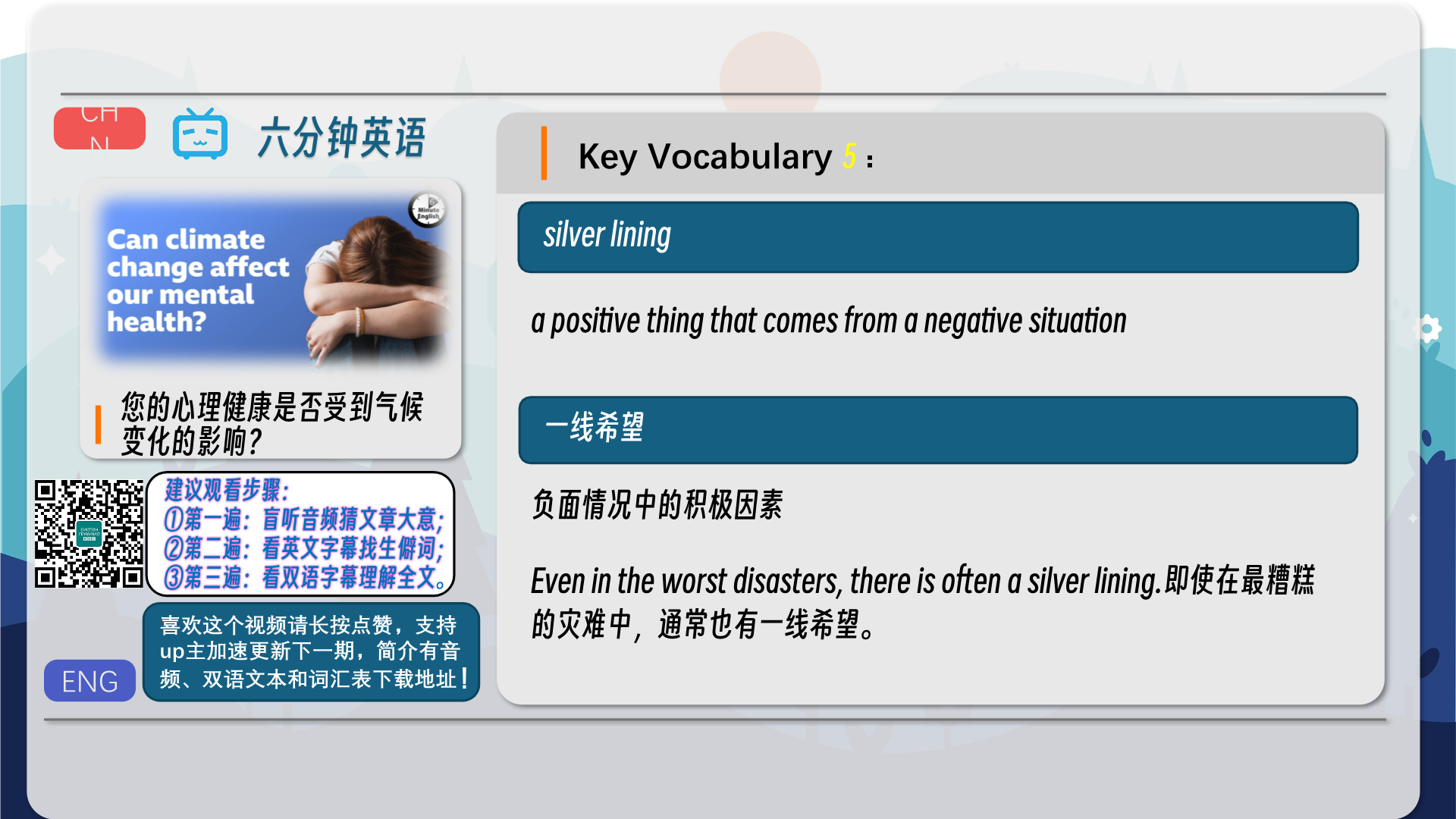
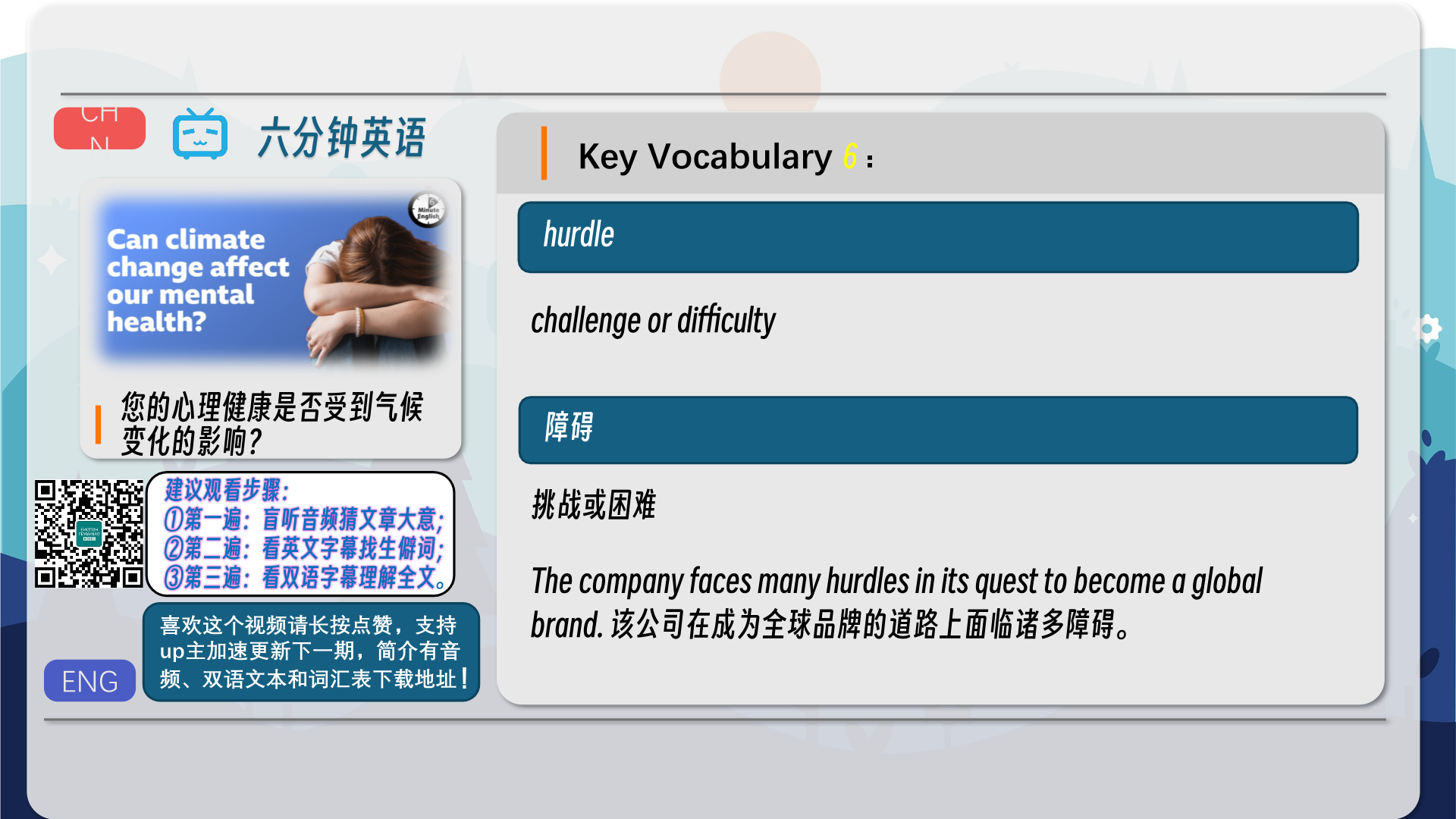
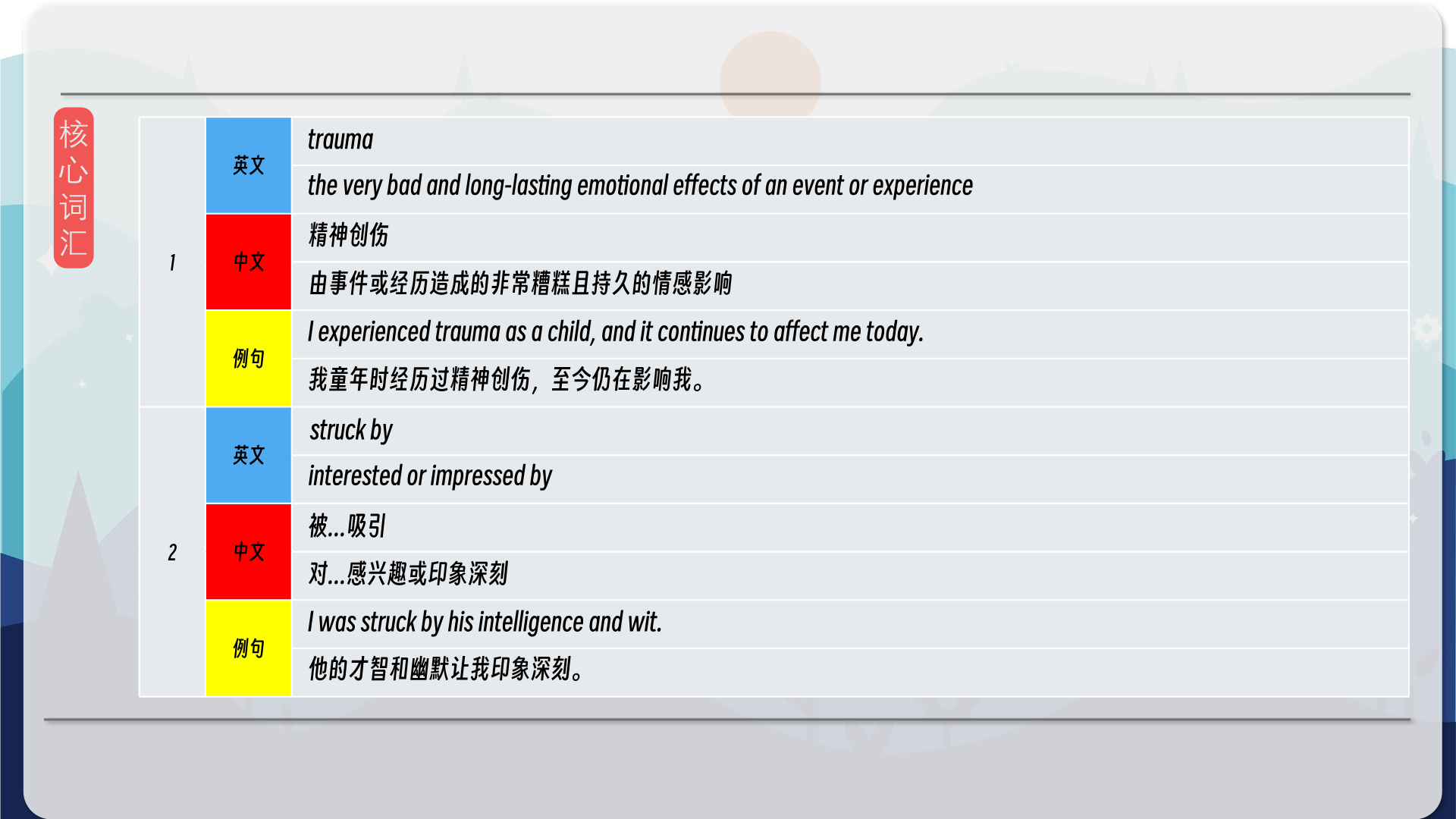


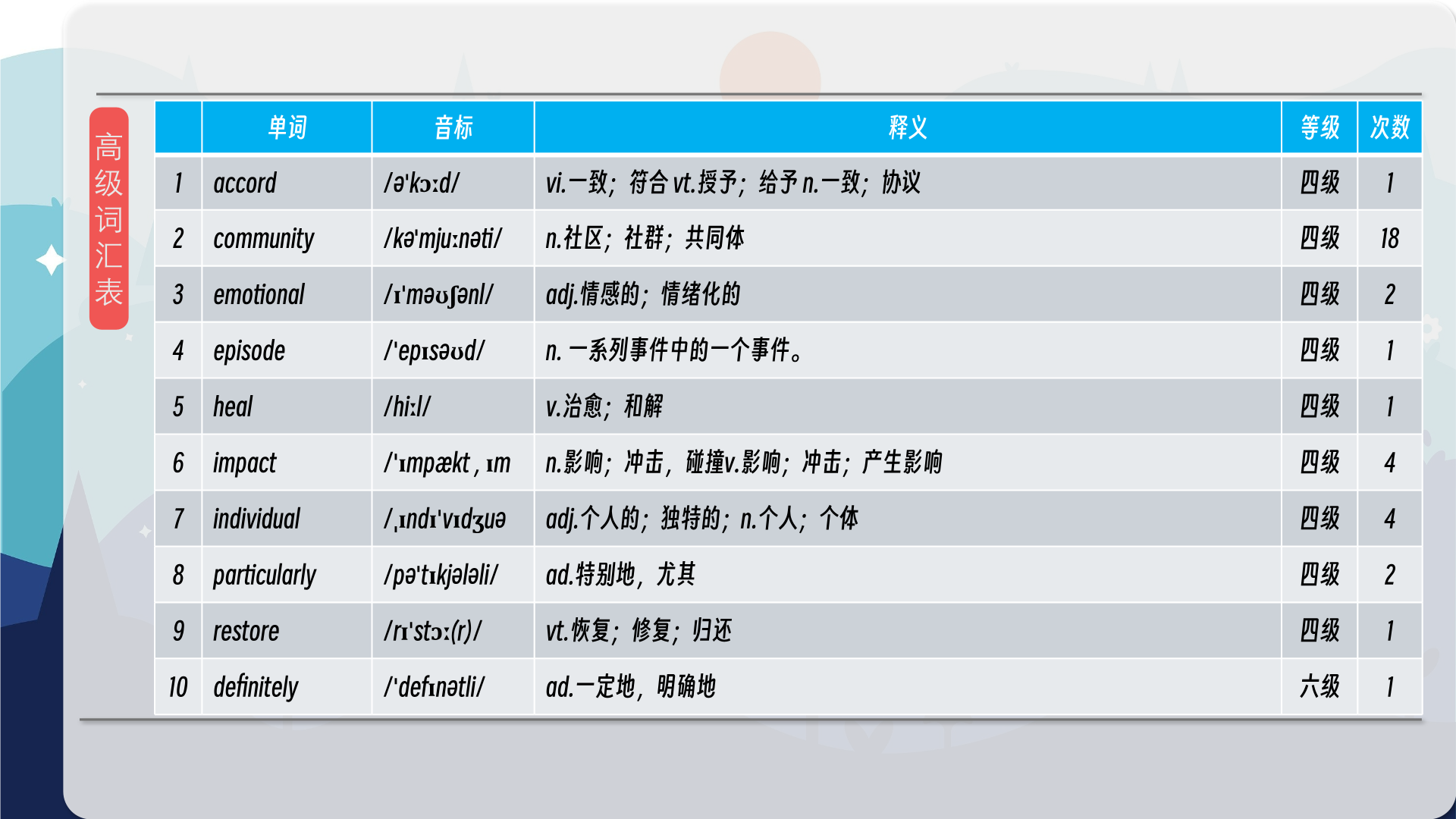



【核心词汇】
trauma
the very bad and long-lasting emotional effects of an event or experience
精神创伤
由事件或经历造成的非常糟糕且持久的情感影响
I experienced trauma as a child, and it continues to affect me today.
我童年时经历过精神创伤,至今仍在影响我。
struck by
interested or impressed by
被…吸引
对…感兴趣或印象深刻
I was struck by his intelligence and wit.
他的才智和幽默让我印象深刻。
reknit together
become closer again
重新团结
再次变得亲密
The crisis helped reknit the community together.
这场危机帮助社区重新团结起来。
resilient
able to get better more easily when bad things happen
有韧性的
在糟糕的事情发生后更容易好转的
Children are often very resilient.
孩子们通常很有韧性。
silver lining
a positive thing that comes from a negative situation
一线希望
负面情况中的积极因素
Even in the worst disasters, there is often a silver lining.
即使在最糟糕的灾难中,通常也有一线希望。
hurdle
challenge or difficulty
障碍
挑战或困难
The company faces many hurdles in its quest to become a global brand.
该公司在成为全球品牌的道路上面临诸多障碍。
在公众号里输入6位数字,获取【对话音频、英文文本、中文翻译、核心词汇和高级词汇表】电子档,6位数字【暗号】在文章的最后一张图片,如【220728】,表示22年7月28日这一期。公众号没有的文章说明还没有制作相关资料。年度合集在B站【六分钟英语】工房获取,每年共计300+文档,感谢支持!